
2009 YEAR IN REVIEW
page 2
john cribbs
Cribbs and Funderburg both wrote eeriely similar essays about Quentin Tarantino's Inglourious Basterds for their Year in Review write-ups. Part of the extreme similarity reults from the fact they had discussed the movie with each other quite a bit before writing about it, part of it comes the fact that they were both treated to the same asinine Tarantino quote that serves as the spine of both essays, partly it's one of those harmonic convergences that (to quote Egg Shen) "brings order out of choas." John's streamlined, succinct 1,300 word version can be read directly below. If you're more in the mood to see the same points really driven into the ground, click here for Christopher's 4,400 word take.
THE WORST MOVIE OF THE YEAR
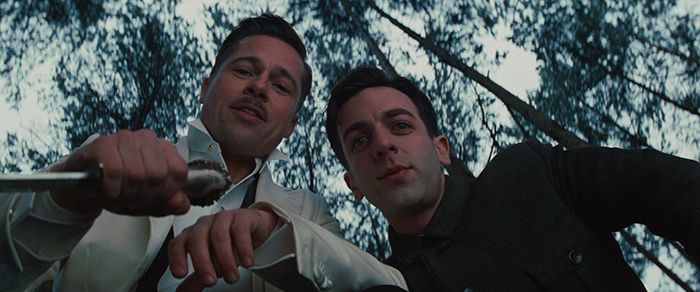
Inglourious Basterds. [sic]
In a recent interview, Quentin Tarantino brought up a scene from John Milius' 1984 communist-paranoia invasion film Red Dawn. "The Wolverines capture a soldier, and there's a little bit of back and forth, should we kill him or not, and C. Thomas just blows him away with a shotgun... those are the kind of things you say, 'that's exactly what I would do.' It's what I want to see, and when I don't see it, I become frustrated, and then if feels like a movie as opposed to real life." His misunderstanding of this scene speaks volumes. First off Quentin, C. Thomas killed the guy with a machine gun, not a shotgun. Minor point. More significantly, the one who gets shot isn't a captured soldier. He's a classmate of C. Thomas Howell's who has been with the group of young American rebels since the beginning of the Soviet incursion. He's recently been forced to swallow a tracking device by the Russians under threat of torture and death. When his fellow patriots find out, there's an extended argument as to whether he should be executed for betraying them. This is not a simple decision: this is a young man they all know and grew up with, on his knees, unarmed, begging for his life, trying to convince them that he had no choice. When C. Thomas takes it upon himself to shoot his classmate in cold blood, it's a horrifying action that shocks and sickens his fellow students. It's a devastating moment of moral confusion, the kind that youd find in a real life war.
And Tarantino's reaction to this guy being executed? He wants to stand up and cheer.
Let's pretend for a minute that Tarantino's inexplicably revered, like, revenge movie but more like, you know, a western that just sorta happens to be set in Nazi-occupied France wasn't the inexcusably irreverent basterdization of 80 years worth of movies made around the world lamenting the atrocities, celebrating the valor of soldiers and exploiting the excitement of World War II. For argument's sake, let's say it felt the slightest bit authentic; that it didn't exhibit a five-year-old's understanding of history and geography, and wasn't permeated with the stink of self-love. We'll act like Tarantino wasn't under the assumption that, since it's a given that people hate Nazis, they'd enjoy seeing them all horribly killed, so his scalp-happy brigade of Basterds would be cheered on in their indiscriminate slaughter, exonerated by the terrible acts of their enemies. I mean think about Schindlers List, an attempt to understand a horrible, complex genocide and the question of responsibility in simplistic, structural Hollywood terms. Inglorious Basterds is even more offensive: Tarantino's juvenile take is that there are two sides to a war, the good guys and the bad guys. If you have any involvement with the bad guys, you should fucking die. It makes Tarantino want to stand up and cheer to see the wives of German officers, artists who didn't flee Nazi Germany, French citizens unable to make a stand and risk their lives and their familys lives to fight against oppression to go down in a spurge of fire and bullets. That's the kind of thing that makes Tarantino stand up and cheer, and why aren't you cheering too? Look at the clownish buffoon QT has turned Hitler into, not at all different from his representation on stage in Mel Brooks The Producers! Well, what's wrong, don't you hate Hitler? He's a tool, right? And since those lazy European Jews can't fend for themselves, why didn't the Allied forces send in an elite squad of American Jewish soldiers to clean his clock? That's what I wouldnt done, man! You're welcome.
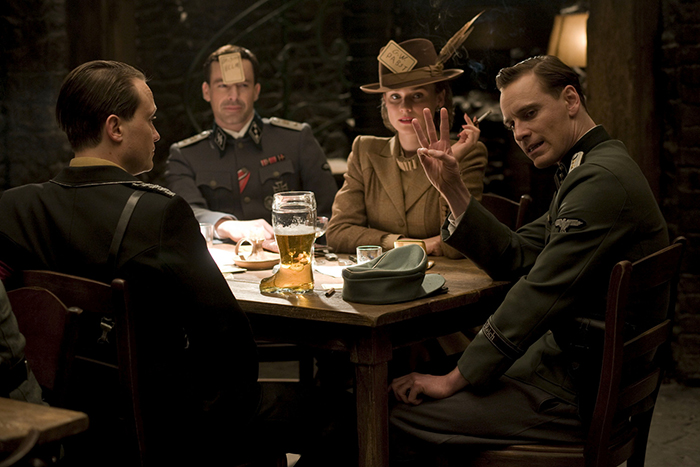
Anyway, let's shuffle all that off to the side for now. It's just a movie, right man? That's been Tarantino's defense all along, but is it really a movie? To me it seems more a patchwork of intolerably long sequences of two or more people talking that ends in a sudden burst of violence. Holy shit: the soldiers rushing in to machine gun the hidden Jewish family when you thought it was just a scene of two dudes shooting the shit really got me, but Eli Roth beating a German officer to death with a bat after Brad Pitt was being so nice to the guy got me even better, then I was really surprised when the people in the tavern all decided to start shooting each other after about an hour of hanging out and having a good time and also when the evil Jew Hunter randomly cut the pleasant chat short by randomly lunging on the actress-traitor and throttling her to death, which was only slightly more insane than when the undercover Jewish girl pulled out a gun and shot the Nazi war hero after a few minutes of civil conversation. Tarantino, what have you go for us next? Let me guess, an epic denouement where Brad Pitt is being so nice to the Jew Hunter when he suddenly and randomly pulls out a gun and shoots his enemy? I thought they were just shooting the shit, hanging out and having a good time! Cuz you get it? It's war, bub! Violence is just something that happens in war, right, even when things seem to be going well. The scenes don't develop in a way that they deserve their stark outcome, and actual characters are nonexistent. Christoph Waltz, probably the most celebrated aspect of the movie, is nothing but a clichéd snaky villain who seems like a nice fella but WATCH OUT he's actually dangerous! Bet you didn't see that coming.
So maybe the message is garbage and the screenwriting is lazy, but what about the subtext? There are people who buy that it's all about the explosive force of art over the unbendable river of history, the destructive power of propaganda realized as a giant explosive movie that literally kills its audience. But give me a break. Tarantino may borrow music and shots and character names and titles from other movies but he actually doesn't understand them at all. Will this film teach casual filmgoers aboutG.W. Pabst and Le Corbeau? Does invoking the name of Leni Riefenstahl lend the story of bloodthirsty soldiers tattooing their enemies foreheads with swastikas some sort of relevance? Because according to Tarantino Leni Riefenstahl deserves to die! This is a movie made by someone who really doesn't understand movies, appreciated by people who don't understand movies. Critics who compare the ending to Peckinpah just because there are machine guns being fired infuriate me, but it's a typical response to Tarantino: he's supposed to have all this stored film knowledge, therefore it should be taken as rote that the movie will informed by it. But can anyone take QT's pop culture cred seriously after that Cat People sequence? The fact that all he took from Enzo Castellari's 1978 B-war movie was the American title (which was originally translated from the Italian as That Damned Armored Train) strongly suggests that he likes the presentation of exploitation and cult movies but not the actual content that makes them what they are (and no, cheesy freeze-frame, 70's font introduction of characters does not prove otherwise.) Based on this film, Tarantino doesn't actually like those kinds of movies, he doesnt like war movies, he doesn't like Nazis (just so you know, he's anti-Nazism) he mainly just likes to think of himself as a brilliant auteur. Which would be fine, he can delude himself as much as he pleases, if he didn't constantly walk the line between serious filmmaker and pulp provocateur, claiming a quality of style and screenwriting and subtext while defending his movies tasteless moral ineptitude with hey, I'm just a guy likes movies and loves makin 'em, what do you want from me? That brings up the theme of responsibility again, and it's all on Quentin.
(Props to PVT Paul Cooney for bringing my attention to the Red Dawn article.)
MORE BAD NEWS
Adventureland.
A.k.a.
What's My Appeal?
On the surface I've got nothing against a good old fashioned cruise down Nostalgia Boulevard to that time in life (be it the 60's, 70's, 80's or 90's) where the future was dim and scary but the present was full of hope and promise in the form of a pretty girl who just gets me. But it's not enough to dress your cast in faded Smurf shirts and pipe in 80's hits, you've got to have a little character in there. There's no reason to give a shit about the unappealing Jesse Eisenberg and his whiny angst over going to college, or his being forced to work a summer job at the carnival which is so beneath him. It's even harder to care about Kristen Stewart, whose not-classically-pretty looks make her right for the part but fail to supply the charm found nowhere within her cardboard personality. Maybe if she would just bite the bottom of her lip one more time? Nope, still not doing anything for me. With these two ineffective leads there's not a lot of fuel to this ship, which is captained by a director still uncertain how to stage a funny scene (and he's helming the next Nick Frost-Simon Pegg movie so he'd better start learning.)
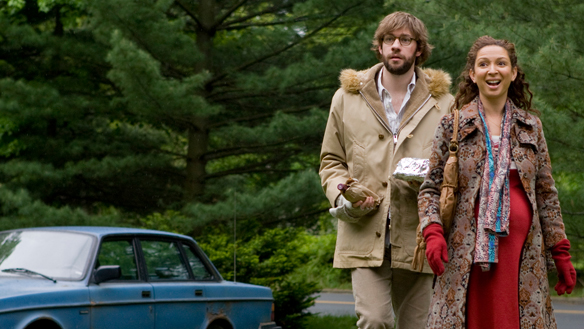
Away We Go.
If Juno wallowed in the smug hipness of its pregnant young protagonist while bemoaning the material lives of the adopting couple, then Away We Go wants to have its cake and eat it too by making the expectant pair its smug, hip heroes. What could have been an interesting study in young soon-to-be-parents trying to find their place in North America is instead a prolonged examination of how much better the ironically detached couple are than everyone else they meet. Honestly, as an aimless parent-to-be myself, I saw this movie with the nave hope that there it would offer some form of guidance. No luck there: the screenplay consists entirely of these two amazing people meeting other young couples who are alternatively dumb, pretentious, obnoxious, lifeless and full-on retarded.
Presumably this journey is meant to reassure the couple of their general awesomeness and superiority. A road-discovery movie in the tradition of David O. Russell's worst film Flirting with Disaster (just change "searching for parents" to "searching with parents"), the film could at least offer some comedy but can only obsess with people being convinced that Maya Rudolph is more pregnant than she actually is. They think she's a month further along in her pregnancy, hilarious! I always accuse Ang Lee of being the artless substitute teacher of world cinema, but Brit Sam Mendes must fill that role for American movies, be they of gangster, war or hip indie variety. Add a husband-wife team of idiosyncratic novelists whose books fill the shelves of hipsters around the country and your supercilious, not sharply-observed send-up of all the idiots out there is complete.
The Box.
I should really be focusing on slamming the likes of Jason Reitman and Wes Anderson, filmmakers who can do no wrong in the eyes of everybody for some damn reason, but I just couldn't even bring myself to sit through their movies this year. I should have tried, because there's no fun in kicking a filmmaker when he or she, no matter how untalented, is down (hence me leaving Jennifer's Body more or less alone and even being kind of curious to see it in the wake of its critical and commercial failure.) And you know I thought about it, and I don't think Richard Kelly is talentless. He's just somebody who's interested in interesting things, but is incapable of making them seem interesting to anyone else.
Hence his taking the irresistible, existential premise of Richard Matheson's 1970 short story Button Button a normal couple are given the choice of life or death for a random person in the world in exchange for a large sum of money and using it as a springboard for a random assortment of scenes that focus on Kelly's fascination with disfigurement, NASA, the play No Exit, big libraries, old TV commercials, 8mm film reels, wind tunnels, time portals, alien conspiracies, Arthur C. Clarke, Christmas decorations and the wallpaper of 1970's suburbia without linking them in any narrative sense. He never attempts to create characters in his films, only situations for actors to find themselves in, usually accompanied by a song Kelly really likes (not as forcibly so as with Anderson, but still a substitution for substance.) The Box is a remarkable time-waster, it's not any good, but I still found it more successful than anything else its director (seemingly humbled after the Southland Tales debacle) has done. I guess that should count for something.
The Burning Plain.
So what Big Important Problem does Guillermo Arriaga intend to acknowledge and sporadically fritter around through nonlinear, interwoven multi-character strands this time? Love, dawg, love. And how hard it is to love another person in this topsy-turvy world because of, uh... communication and, er... global displacement? That do anything for you? I guess because of his other Big Important Problem movies, the screenwriter (making his directorial debut) was able to gather enough clout to put this dreck on the big screen instead of on Lifetime where it belongs. Seriously, a character slips into a coma due to injuries sustained in a crop dusting accident? Who writes this melodramatic bullshit? Only the most overrated hack since Ehren Kruger.
Eccentricities of a Blond Haired Girl.
Several quality films from this year experimented with visual tedium. We got to see a plainclothes cop follow a lot of people around in wordless sequences of Police, Adjective. We were privy to Isaach De Bankolé ordering two more espressos and having yet another person ask if he speaks Spanish in The Limits of Control. Some worked better than others. What definitely didn't work was the seemingly endless carrying out of mundane activities in Manoel de Oliveiras just-barely hour-long story of an average young guy in love with a bland girl across the street. I love Bresson, and I'm not kidding when I say this movie felt like Bresson on Ritalin. I just found it hard to understand what watching a boring person open envelope after envelope of mail is supposed to tell you about the character other than the fact that he's boring. I've heard that Oliveira is an old master - apparently he's a master of the master shot. The exact. Same. Master shot. Shown at least half a dozen times throughout the film.
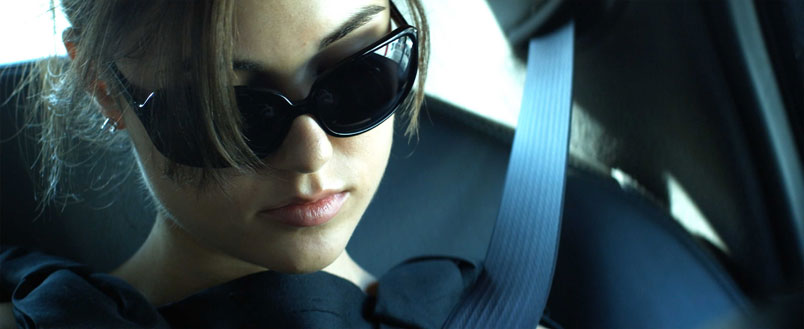
The Girlfriend Experience.
I have a lot of respect for Steven Soderbergh. He's the most determined and openly experimental filmmaker working in Hollywood, and if he happens to release one of the best and one of the worst movies of any given year I think it speaks more for his versatility than his unevenness (I havent seen Che yet.) He's not afraid to take risks, and his 20-feature filmography (going on 23) has its share of highlights and stinkers both from his cache of bigger studio projects and more personal collection of smaller, looser efforts. This is a stinker from the smaller, looser pile but you can't blame it for trying. I like that the movie is shot on DV with the same kind of awkward curiosity as James Spader's voyeur videos from sex, lies and videotape. Plotwise, Soderbergh is clearly channeling Antonioni, but the things he's trying to say - that being an escort is as tedious a job as any other, that johns are (shockingly) a little sleazy - aren't particularly revelatory or dramatic. Hip critics have supported and conservative critics have bashed the performance of Sasha Grey (if that is her real name), but she doesn't give so much a bad performance as an absent one. Soderbergh lets her and the rest of the cast shuffle through a lot of muffled, humorless improv to be sorted out in the editing room later, but unlike with Bubble he can't actually get the actors to say anything interesting (or, often, intelligible.) And the photography is distractingly bad; he really has to fire Peter Andrews.*
* Yes, smartass, I know that Peter Andrews is actually Soderbergh.
The Imaginarium of Doctor Parnassus.
Terry Gilliam's latest was an improvement upon his last two films, but don't let that fool you. It's still not any good, including everything one would expect from a Gilliam movie except any visually stimulating scenes (the one exception is where they find Heath Ledger hanging from the bridge) or the smart comedy (a shame, since this marks a reunion with Brazil co-writer Charles McKeown.) Gilliam has become too much the sad old character of his latest film, sitting prone on the stage, reassured by young people around him that he's still talented and relevant. Whether or not Dr. Parnassus would have been nearly as well received had Ledger not died is debatable, but the most interesting thing about the film is how Depp, Law and Farrell sub in for the character when he enters the title wonder-arium. The movie would have been only half as interesting without that aspect, so for the most part the real-life tragedy ends up as a benefit rather than a curse - until the nonsensical ending where Gilliam couldnt think of a way to wrap things up without his original lead.
Life During Wartime.
Todd Solondz is smart, observant and, yeah, he's funny, but he will always be susceptible to the fact that he's Todd Solondz. He never met a masturbation scene or abortion joke he didn't like, and maybe those things seemed edgy to some people in the days before South Park, but I can't imagine he's offending anyone these days. The idea of sequelizing his arthouse hit Happiness with new actors playing the same parts isn't a bad one, but unless he's bringing something new to the table there isn't much point to it either. His angle here is a little frightened redheaded boy obsessed with 9/11 who thinks the terrorists are going to destroy everything, which is the extent of the overtly political content Solondz has claimed drives the film. Able to identify Americas sore spots but not to meaningfully exploit them, the director is inching ever closer to full-blown self-parody.
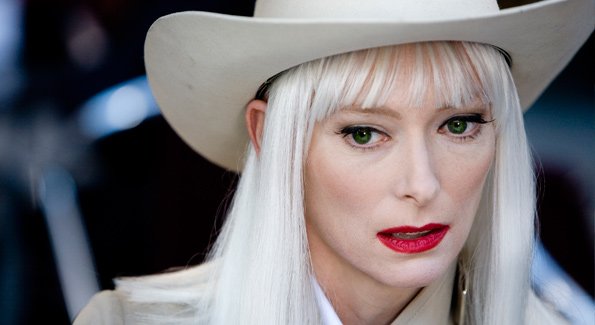
The Limits of Control.
"What a terrible film all we do is meet strange characters." This quote from Godard's Week(end) has come to me now and again, but never so much as when I was watching Jim Jarmusch's exercise in tedium. Tilda Swinton as a blonde in a designer Cowgirl outfit, John Hurt as a Brit in a beret, Gael Garcia Bernal as a Mexican in an apron: each comes along to have Isaach De Bankolé listen to them wax oblique and then depart. Jesus Jim, this is a film, not the open notes for your philosophy test! The really sad thing is that he took tons of stuff I love - southern Spain, the Parker books, actors from Claire Denis films, gorgeous girls wearing nothing but glasses and referencing Contempt, even more gorgeous windows and furniture, Christopher Doyle photography, old guitars and pickup trucks - and did absolutely nothing with them. I'd accuse him of being unable to make great things seem great in the Richard Kelly vein, but this is Jarmusch. We know he can make a good movie, or at least something that resembles an actual movie. Isn't he too old for this kind of oblique student film self-indulgence? I wish I could say I found myself enraptured, hoping that Isaach De Bankolé would order two more espressos and have someone else ask him whether or not he spoke Spanish before moving on to his next non-adventure.
(continues on next page with the most INEXPLICABLY ADORED films of 2009)
<<Previous Page 1 2 3 4 Next Page>>
home about contact us featured writings years in review film productions
All rights reserved The Pink Smoke © 2010